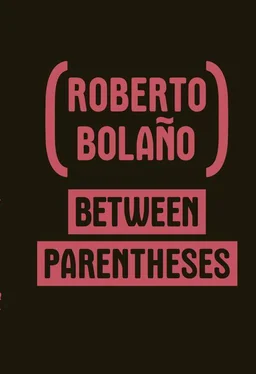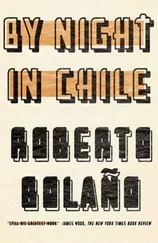Roberto Bolaño - Between Parentheses - Essays, Articles and Speeches, 1998-2003
Здесь есть возможность читать онлайн «Roberto Bolaño - Between Parentheses - Essays, Articles and Speeches, 1998-2003» весь текст электронной книги совершенно бесплатно (целиком полную версию без сокращений). В некоторых случаях можно слушать аудио, скачать через торрент в формате fb2 и присутствует краткое содержание. Год выпуска: 2011, Издательство: New Directions, Жанр: Публицистика, Критика, на английском языке. Описание произведения, (предисловие) а так же отзывы посетителей доступны на портале библиотеки ЛибКат.
- Название:Between Parentheses: Essays, Articles and Speeches, 1998-2003
- Автор:
- Издательство:New Directions
- Жанр:
- Год:2011
- ISBN:нет данных
- Рейтинг книги:4 / 5. Голосов: 1
-
Избранное:Добавить в избранное
- Отзывы:
-
Ваша оценка:
- 80
- 1
- 2
- 3
- 4
- 5
Between Parentheses: Essays, Articles and Speeches, 1998-2003: краткое содержание, описание и аннотация
Предлагаем к чтению аннотацию, описание, краткое содержание или предисловие (зависит от того, что написал сам автор книги «Between Parentheses: Essays, Articles and Speeches, 1998-2003»). Если вы не нашли необходимую информацию о книге — напишите в комментариях, мы постараемся отыскать её.
The Savage Detectives
Between Parenthese
Between Parentheses: Essays, Articles and Speeches, 1998-2003 — читать онлайн бесплатно полную книгу (весь текст) целиком
Ниже представлен текст книги, разбитый по страницам. Система сохранения места последней прочитанной страницы, позволяет с удобством читать онлайн бесплатно книгу «Between Parentheses: Essays, Articles and Speeches, 1998-2003», без необходимости каждый раз заново искать на чём Вы остановились. Поставьте закладку, и сможете в любой момент перейти на страницу, на которой закончили чтение.
Интервал:
Закладка:
Here we can find gems like this: “When a true genius appears in the world, you may know him by this sign, that thedunces are all in confederacy against him” (from Thoughts on Various Subjects ). Or “men are never so serious, thoughtful, and intent, as when they are at stool” (from Gulliver’s Travels ). Or “Silenus, the foster-father of Bacchus, is always carried by an ass and has horns on his head. The moral is that drunkards are led by fools and have a great chance to be cuckolds” (from Miscellanies ). Or “every man desires to live long; but no man would be old (from Thoughts on Various Subjects ). Or “I have got materials toward a treatise proving the falsity of that definition, animale rationale , and to show it should only be rationis capax . Upon this great foundation of misanthropy the whole building of my Travels is erected” (from the Letters ).
If our parents and grandparents had really read Swift, they wouldn’t have taken us to see the animated movie version of Gulliver’s Travels that I believe came out in the 1960s. Actually, if the authorities or those benighted souls called teachers had really read Swift, they would’ve found a way to ban the movie in Chile. Because one of the great Irishman’s qualities is that no matter how sugarcoated the adaptation of his masterpiece, it’s still a time bomb.
Of course, making a film of A Tale of a Tub would seem to be an impossible undertaking. And if anyone tried to make a film of A Modest Proposal for Preventing the Children of Poor People in Ireland from Being a Burden to Their Parents or Country and for Making Them Beneficial to the Public it would surely elicit heated protests from some Association for the Protection of Minors that has failed to come to the obvious conclusion that neither in our day nor in Swift’s are children commonly served up as appetizers to cannibals.
“I have never expected sincerity of anyone, and I’m no more angered by the lack of it in a man than by the color of his hair,” says a Swift weary of imbeciles. And he also says: “I have ever hated all nations, professions, and communities; and all my love is toward individuals.” And: “My main purpose in everything I do is rather to enrage than to amuse.”
This Swift is dangerous. He wallops his readers and keeps them up at night. And yet, if we don’t want to be slaves, if we don’t want our children to be slaves, we must read him and read him again. The task is urgent.
ERNESTO CARDENAL
In 1973, any twenty-year-old who wanted to be a poet read Ernesto Cardenal, author of Epigramas [Epigrams], Oración por Marilyn Monroe [Prayer for Marilyn Monroe], Psalms, Homage to the American Indians , this last a new, if flawed, response to Whitman and superior in many ways to Neruda’s Canto general .
Out now is a book of memoirs with the lapidary title Vida perdida [Lost Life] (Seix Barral), and reading it one can’t help but remember a time when reading Cardenal, a Catholic priest, was fascinating to us — precisely us, lustful sinners who never went to Mass, partly because the priests were such a drag but mostly because we didn’t believe in God. And we had no plans to mend our ways, instead becoming bigger and bigger sinners, and in this endeavor we were helped along, not to say spurred on, by the poetry of Ernesto Cardenal. Now this book appears, uneven like almost all memoirs (and like life), and Ernesto Cardenal’s voice hasn’t changed but everything else has changed, and what was once hope, an invitation to the unknown (or so it seemed to us), now seems more like silence and stillness, a silence and stillness emanating from a lost province where Cardenal still lives and goes about his business, despite all the battles he’s lost, recounting in stately prose the vicissitudes of his family, because that’s what Vida perdida is about, the fate of a family and the fate of a man who’s one of the great poets of Latin America, plus sketches of some friends who live on after death, like the great American writer Thomas Merton, also a priest, and what we’re left with in the end is a life that’s more triumph than failure: a final image of Cardenal as a man who lives in limbo, which isn’t a bad way to live, next door to heaven.
A NOVEL BY TURGENEV
When I was eighteen I read a book by Ivan Turgenev that dogged me for the next eighteen years. By that I don’t mean to say I thought about the novel and its protagonist’s tragicomic fate every day, but from time to time the story seemed to loom over me like a serial killer or a question mark. I don’t even remember the title. It isn’t among the books by Turgenev that I own. I can’t be sure, but I think it was Rudin . Without a doubt it’s one of the saddest novels I’ve read in my life.
The plot is as follows: a young man arrives at a country house, owned by one of the richest men in the region. I don’t remember what brings him there. Probably he’s been hired as a tutor to the landowner’s children. He’s from Moscow or St. Petersburg, of course, and he’s versed in the latest city fashions as well as its most advanced ideas. In a word: he’s an intellectual and also as handsome as the young Werther, and in time he infects the children with the virus of adventure and revolution, in a manner calling to mind the first chapters of Explosion in a Cathedral, by the Cuban writer Alejo Carpentier, except that in Carpentier’s book the children are on their own, orphans in a sense, and orphans, as we know, are a blink away from adventure or just about anything, and in Turgenev, Carpentier’s precursor, the young students aren’t orphans and the revolution is thousands of versts away. Of course, this distance matters little to the young Russians, and it matters even less to the older of the two siblings, a beautiful, headstrong girl who begins to dream of a bohemian life in Paris, in the company of her tutor, naturally. At first, the young Moscow intellectual (let’s say he’s from Moscow) is flattered by the love his student professes for him, but later, as he glimpses the future that awaits him, he begins to have his doubts. First, he doubts that the student’s love will survive the daily privations of a life lived hand to mouth, even a life lived between Paris and Venice or Paris and Geneva. Then he doubts himself, because it’s one thing to preach change, political or personal, and quite another to actually strive for it. He begins to consider the likely reaction of the girl’s father, who respects him as a tutor and an intellectual and who, when the moment comes, won’t hesitate to call on influential friends in Moscow (or St. Petersburg) to help the young man find a better job and begin to build a secure and possibly even brilliant future for himself, but who would in no way tolerate the young man’s marriage to his daughter. Finally, he thinks about himself, about what he wanted when he left the city (the help of the rich landowner, etc.), and what he’ll have if he listens to his heart and runs away with the disinherited heiress.
Along very broad lines, that’s the whole novel, similar in some ways to Stendhal’s The Red and the Black , though definitely a lesser work. Of course, the handsome young intellectual chooses security (his security) and eloquently rejects the love of the girl, who, I seem to recall, soon marries her former suitor, an utter peabrain, which goes to show that either she isn’t very smart after all or she’s a confirmed masochist. But then comes the best part of the novel, just when it seems as if everything’s settled and the end is near. The young intellectual suddenly realizes that he is in love with the heiress. And he also realizes that his behavior has been shameful and despicable. I’m not sure, but I think he writes the girl a letter and then tries to kill himself on the grounds of the country house. He can’t do it, discovering in a single night his love and his cowardice. The next day he leaves the house empty-handed, with no letters of recommendation. In Moscow, back in the outside world, he disappears. He isn’t heard from again. Thirty years go by. In the novel’s last chapter or final paragraphs, the reader is shown a barricade in Paris, described with great sympathy, a barricade manned by the poor, by the disinherited, but also by adventurers and bohemians from the most far-flung corners of Europe. The army charges. From the top of the barricade a white-haired old man whose appearance betrays the vestiges of a lost grace urges on the defenders. He’s felled by a bullet. Some strangers or possibly friends carry him to his poor foreigner’s room. As he lies dying, the old man speaks in Russian, and Turgenev suggests to us that not only has he found courage but also the burning bridge that links words and acts. When I was eighteen, I waited until the very last sentence for his former beloved to suddenly appear at his bedside. But she never came.
Читать дальшеИнтервал:
Закладка:
Похожие книги на «Between Parentheses: Essays, Articles and Speeches, 1998-2003»
Представляем Вашему вниманию похожие книги на «Between Parentheses: Essays, Articles and Speeches, 1998-2003» списком для выбора. Мы отобрали схожую по названию и смыслу литературу в надежде предоставить читателям больше вариантов отыскать новые, интересные, ещё непрочитанные произведения.
Обсуждение, отзывы о книге «Between Parentheses: Essays, Articles and Speeches, 1998-2003» и просто собственные мнения читателей. Оставьте ваши комментарии, напишите, что Вы думаете о произведении, его смысле или главных героях. Укажите что конкретно понравилось, а что нет, и почему Вы так считаете.












